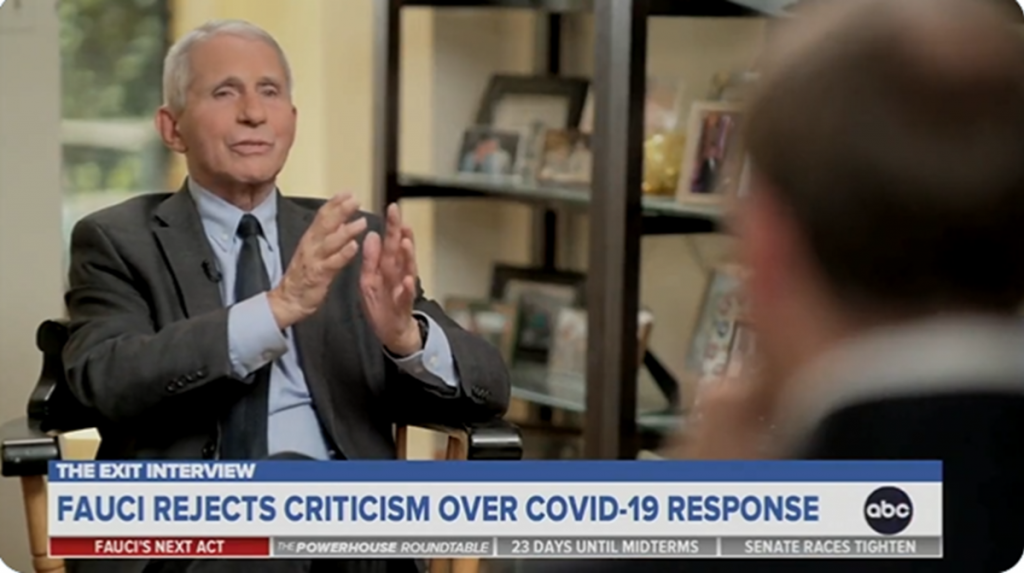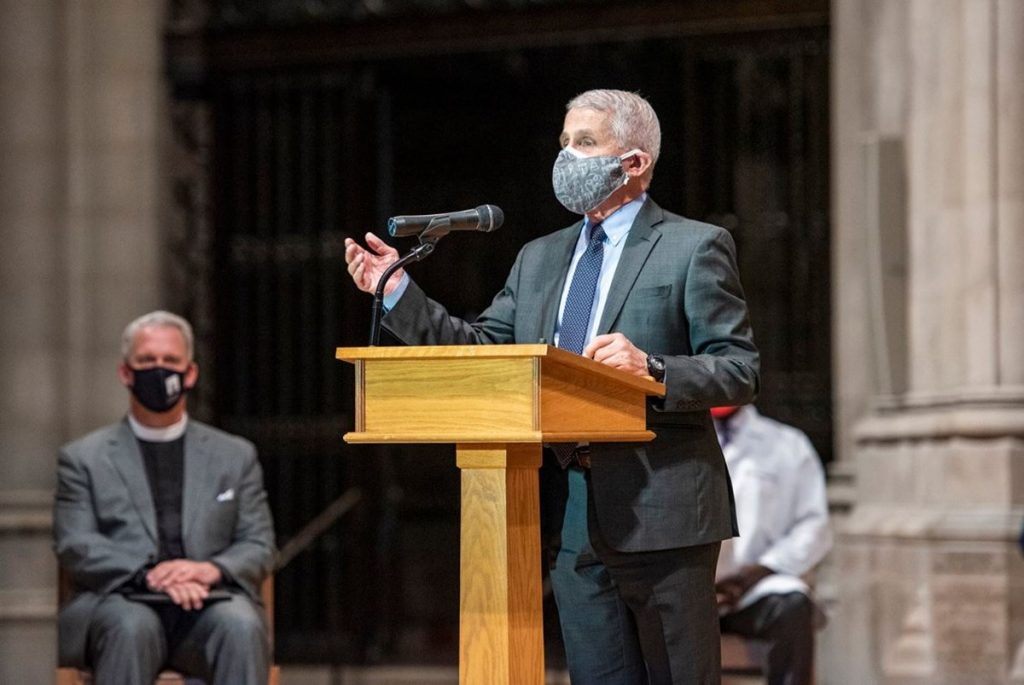Last week, The Atlantic published an article by Dr. Emily Oster, an economics professor at Brown University, titled “Let’s Declare A Pandemic Amnesty.”
In the piece, Oster argues that, throughout the Covid-19 pandemic, we were plagued by a lack of true knowledge about the best way to react to the virus. Consequently, “almost every position was taken on every topic. And on every topic, someone was eventually proved right, and someone else was proved wrong.”
Because of this, Oster argues we should forgive those who were wrong and move on; after all, how could they be blamed for their position when all the information was not available? By doing this, she concludes, we can avoid “a repetitive doom loop” of negativity and address the issues—ranging from a dip in test scores to a rise in mental health problems—that we are now facing.
This may seem like a reasonable argument at first glance. It is true that there was a lot we did not know at the start of the pandemic; it is also true that solely dwelling on the past can prevent people from moving forward in a productive way.
At the same time, upon closer examination, the core of Oster’s argument is deeply flawed because 1) it does not reckon with the real injustices done to millions of people during the pandemic as a result of arrogant policymaking and 2) it fundamentally misunderstands the nature and role of forgiveness in society.
The Consequences of Lacking Humility
The first issue with Oster’s argument is that it does not properly consider the injustices done to millions of people during the pandemic—primarily as a consequence of policy that was profoundly lacking in humility.
We can split up Covid-19 policymaking into two time periods: one is before we had adequate information to make reliable policy decisions and the second is after we had adequate information. I understand these categories are somewhat vague, but they will suffice for our purposes because, as we will see, the issue with the policy-making during both of these periods was the same.
In the first time period, when we did not have adequate information to know what was best, interventionist policymakers nevertheless acted as if they did know. They fell into a trap that the Nobel Prize-winning economist F.A. Hayek called the pretense of knowledge: namely, “the idea that anyone could know enough to engineer society successfully.”
In states across the country—in the absence of real evidence but the presence of real conceit—people were prohibited from visiting their sick family members in the hospital and elderly family members in nursing homes, leaving the most vulnerable in our society alone and their loved ones separated from them—even during the last days of their lives. There were strict limits on the number of people allowed at funerals—depriving the grieving of the best healing power of all: human-to-human connection and support. Public officials even closed beaches, poured sand into outdoor skateparks, and put chains on outdoor basketball hoops—forcing kids into prolonged isolation in their homes.
And for what? How many lives were saved due to such measures? We now know, based on numerous studies, that the answer is few to none. There was absolutely nothing dangerous about gathering outside for a funeral or playing a game of basketball with friends, for example. Yet, policymakers—in a time of admitted uncertainty—acted as if they were certain anyway. And to make matters worse, those who challenged these policies were shut out of the public debate—accused of wanting people to die, of being science deniers, and of spreading “misinformation.”
Then, in the second time period, when we did have adequate knowledge to make well-informed policy choices, policymakers did not follow the evidence, instead opting to follow ideology and cave to social pressure.
School closures are a clear example of this. One of the first things that was known about the virus was that kids were the least vulnerable to severe infection. We also soon found out that schools were not a hotspot of Covid transmission. Even so, there were prolonged school closures across the country, affecting millions of kids.
During the 2020-2021 school year, fewer than a dozen states had at least 75 percent of kids learning in person; in 19 states—including some of the largest in the country—the proportion was under 50 percent. Then, even when kids went back to school, many districts instituted farcical rules such as requiring children to stay home for two weeks any time they had a potential exposure to Covid-19, requiring masking in classrooms, not allowing kids to talk during lunch, and even forcing them to eat lunch outside in freezing weather.
Consequently, kids have now fallen behind months in reading and math—with some people reporting that there are third graders unable to even read three-letter words. Mental health problems have gotten much worse, and there are now kids in second and third grade that do not remember ever having a normal school year. And the detrimental effects we are seeing right now are just the tip of the iceberg.
And so the same question applies here: what was this all for? These policies did little to nothing to protect children, as they were never in significant danger from Covid-19. They certainly did not make the lives of parents easier, as they had to care for their kids learning online even though they had jobs of their own. It didn’t even make teachers safer, as studies have shown that schools were not a place of high transmission. This all happened because arrogant policymakers ignored the evidence or presumed to have knowledge they did not actually possess in order to appease either political entities such as teachers’ unions or their own political ideology that held that Covid restrictions must be in accordance with the most stringent risk preferences.
And it’s not as if public authorities have now learned their lesson. Even today, there are schools across the country that will not allow children to attend unless they received the Covid-19 vaccine, even though the CDC now admits vaccines do not prevent infection or the spread of the virus.
This is not to say that Oster supported all of these measures, as I know for a fact that she did not. Rather, this is to point out that there were real injustices done—injustices that have not been learned from and therefore cannot and should not be so easily forgiven.
Finally, Oster’s article seems to conflate mistakes made in the absence of evidence by private individuals and mistakes made due to arrogance by public authorities. But those two things are not at all the same. The anger that most people feel is towards the latter, yet, from the beginning of the piece, Oster fails to make this distinction. But it is precisely this distinction that illuminates why people feel like we cannot move on: namely, because policymakers assumed that they knew best, forced their vision onto the entire country, and then never took responsibility when their policies harmed countless people.
Misunderstanding the Nature of Forgiveness
The second significant issue with Oster’s argument is that it fundamentally misunderstands the role and nature of forgiveness in society. While it is of course an important virtue, it is also not the only virtue.
In a commentary on the story of Noah, the late Rabbi Jonathan Sacks points out that “the first moral principle set out in the Torah” is that of justice. God says, “Whoever sheds the blood of man, by man shall his blood be shed; for in the image of God has God made man.” However, Rabbi Sacks points out that this principle, on its own, would “[draw people] into a potentially endless and destructive cycle of retaliation, which is bad for both sides.”
Oster intuitively understands this limitation of justice as a stand-alone value. She rightly points out that solely focusing on this in the context of Covid-19 would lead to “a repetitive doom loop” of negativity—never allowing our society to move forward.
Rabbi Sacks agrees. So, in order to account for the limits of justice acting as the only value, he explains that the second moral principle laid out in the Hebrew Bible is that of forgiveness. God said to Noah, after the flood, that “I will never again curse the ground for man’s sake, although the imagination of man’s heart is evil from his youth; nor will I again destroy every living thing as I have done.”
From this, we can derive that the world is built on the dual moral imperatives of justice and forgiveness. Rabbi Sacks writes that “Without these, no group can survive in the long run.”
He is correct. Without forgiveness, we would be stuck in a cycle of bitter attacks against one another. But, without accountability or justice, the injustices that took place are 1) bound to happen again and 2) less likely to be forgiven or forgotten by the victims.
Prerequisites to Forgiveness?
The issue with Oster’s argument is that it assumes forgiveness can and should happen even in the absence of justice. But when an individual is wronged in a serious way, we know from human experience that it is incredibly hard, if not impossible, to move forward productively with the perpetrator until they take responsibility, apologize, and pledge not to wrong that person again. Thus, it is hard to believe that we can achieve forgiveness in the absence of justice or accountability. But, further, generally agreed-upon moral principles would suggest that those who have committed injustices do not deserve to be forgiven—let off the hook, if you will—unless they take responsibility and steps to ensure it does not happen again. And thus, we realize that even if we could achieve forgiveness in the absence of justice, it is not apparent that we should.
This is all to suggest that it seems as though justice and accountability are actually prerequisites to forgiveness.
In the case of Covid-19, we know—as demonstrated in the previous section—that injustices were committed on a mass scale. We can therefore conclude that the first thing that needs to happen toward the end of forgiveness is a substantive reckoning among those who committed those injustices, where they take responsibility for their actions, recognize where they went wrong, and take concrete steps to change the institutions, processes, and policy frameworks that produced such mistakes. This includes people ranging from politicians to public health bureaucrats to union leaders.
To do so would be to demonstrate a tremendous amount of humility—a virtue that should be greatly admired and emulated by others. Public trust can only be restored once this takes place because, right now, there is nothing stopping any of the terrible things that happened from happening again.
In other words, nothing has changed yet.
As always, the proper approach contains a balancing act. The issue is that, currently, too many people have taken extreme positions that neglect one of the two moral principles discussed above: justice and forgiveness. However, the greater the number of people that recognize justice and forgiveness are not mutually exclusive, but rather perfect companions, the closer we will get to being able to move forward as a unified country in order to address the myriad problems we still face.
Jack Elbaum
Jack Elbaum was a Hazlitt Writing Fellow at FEE and is a junior at George Washington University. His writing has been featured in The Wall Street Journal, Newsweek, The New York Post, and the Washington Examiner. You can contact him at jackelbaum16@gmail.com and follow him on Twitter @Jack_Elbaum.
This article was originally published on FEE.org. Read the original article.


